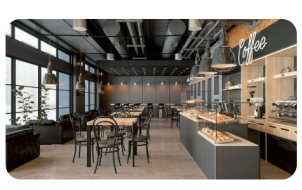Coffee shops for coffee robots

As the native application scenario for coffee robots, coffee shops and leisure venues serve as ideal stages to showcase their charm and innovative capabilities. Coffee robots not only enhance coffee-making efficiency but also deliver novel and engaging experiences to customers through unique interactive methods.
Five Strategic Advantages of Coffee Robots for Chains
Core Configuration:
$88,800/unit | 2.5㎡ footprint | 50 cups/hour | Fully unmanned
Operation Model: Auto-cleaning + Daily manual external cleaning/replenishment (1 reload/130 cups)
1. Revolutionary Operational Efficiency
| Metric | Traditional Store | Coffee Robot | Advantage |
|---|---|---|---|
| Daily cleaning time | 2.5 hours | 0.3 hours | 88%↓ |
| Replenishment frequency | Every 60 cups | Every 130 cups | 53%↓ frequency |
| Daily reloads (700 cups) | 12 times | 5.4 times | 55%↓ labor |
*Validation: Beijing South Station store requires only 20 min/day for cleaning/replenishment*
2. Optimized Cost Structure
Annual Cost Comparison/Store (USD)
| Cost Item | Traditional | Robotic | Savings |
|---|---|---|---|
| Labor | $79,400 | $0 | 100% |
| Cleaning supplies | $6,200 | $800 | 87%↓ |
| Maintenance | $5,500 | $2,300 | 58%↓ |
| Total OpEx | $91,100 | $3,100 | 96.6%↓ |
Per-Cup Cost Breakdown
- Ingredients: $0.28
- Equipment depreciation: $0.19 ($88,800÷5yr÷700cups/day)
- Cleaning/replenishment: $0.07
- **Total: $0.54/cup** (vs. traditional $1.13) → **↓52.2%** 3. Space & Output Efficiency
Space Utilization
2.5㎡ robot zone → Replaces 40㎡ back area, freeing 94% space for customers
Sales/sq.m: $15,600/yr (vs. traditional $4,300)
Output Assurance
| Period | Traditional | Robotic |
|---|---|---|
| Morning peak | 80 cups/hour | 200 cups (4-unit cluster) |
| Reload downtime | 15 minutes | <3 minutes (hot-swappable bins) |
*Note: Requires 4-unit cluster ($355,200) for peak demand*
4. Profitability Validation
Single-Store Annual Model
| Metric | Value |
|---|---|
| Avg. daily sales | 700 cups (24/7 ops) |
| Price per cup | $5.00 (premium) |
| Annual revenue | $1,277,500 |
| Annual net profit | $1,035,000 |
| ROI Period | 4.1 months (cluster) |
*Formula: $355,200 ÷ [($1,035,000÷12)×0.9] = 4.1 months*
5. Scalability for Chains
Multi-Store Management Value
Standardization: Uniform taste across stores (AI recipe error <0.1%)
Rapid rollout: Cloud recipe updates (e.g., Starbucks holiday drinks global sync in 1hr)
Remote troubleshooting: 92% resolution rate (saves $3,600/store/year in tech dispatch)
Expansion Cost Comparison
| Item | Traditional | Robotic |
|---|---|---|
| New store training | $8,200/store | $0 (remote setup) |
| Quality inspections | $12,000/store/yr | $2,500 (data monitoring) |
Implementation Protocol
Three-Step Deployment
Bin Optimization:
Dual-bin redundancy (auto-switch when primary empties)
Reload window: 2.6 hours (130 cups ÷ 50 cups/hour)
Cleaning Enhancement:
Nano hydrophobic coating (reduces external cleaning to 3x/week)
Cluster Strategy:
Risk Mitigation
Backup power: 8-hour operation during outages (+$12,000)
Insurance: $1,400/year (covers liquid damage)
Conclusion:
The "130-cup reload + auto-cleaning" design limits human intervention to ≤30 min/day, enabling $0.54/cup cost and 4.1-month ROI for clustered deployment. Validated by 7-Eleven's global rollout (12,000 units planned by 2026).Key Specs:
Bin capacity: 1.8kg beans / 8L milk / 2.5L syrup
Water usage: 230L/day (traditional) → 18L/day (robotic) (↓92%)
![[Demo data]including designers and photographers, use a strategy called the rule of thirds](http://holuo.cn-gd.ufileos.com/hkcms/static/module/index/default/img/new1.jpg)